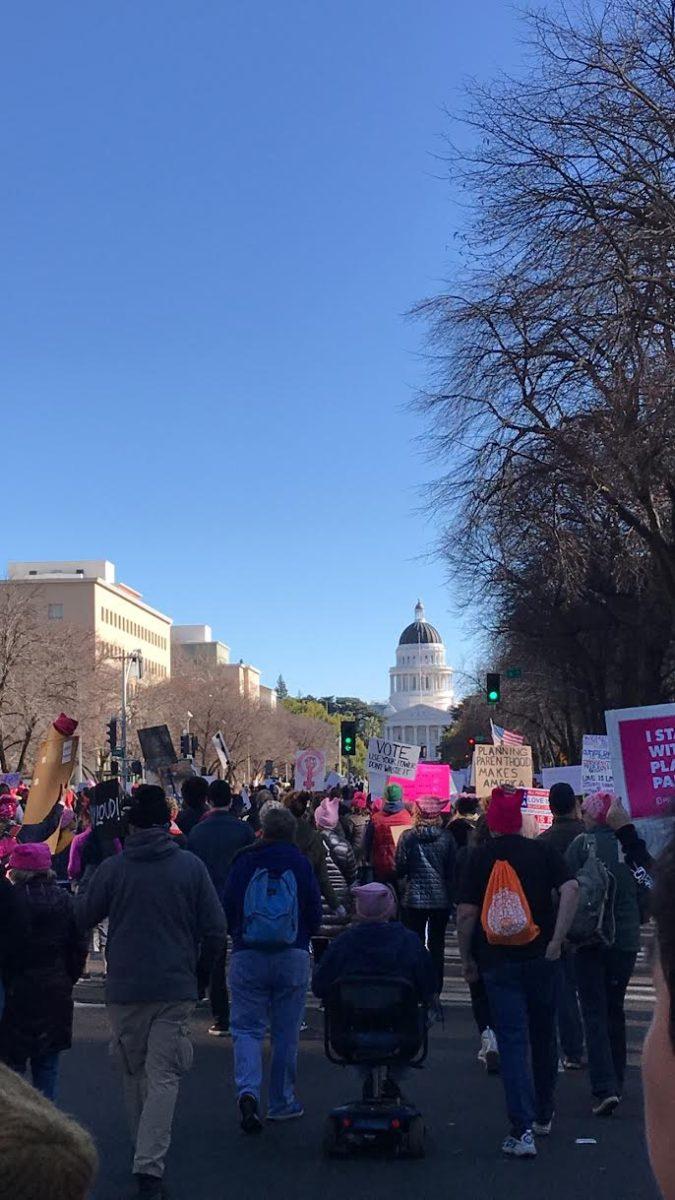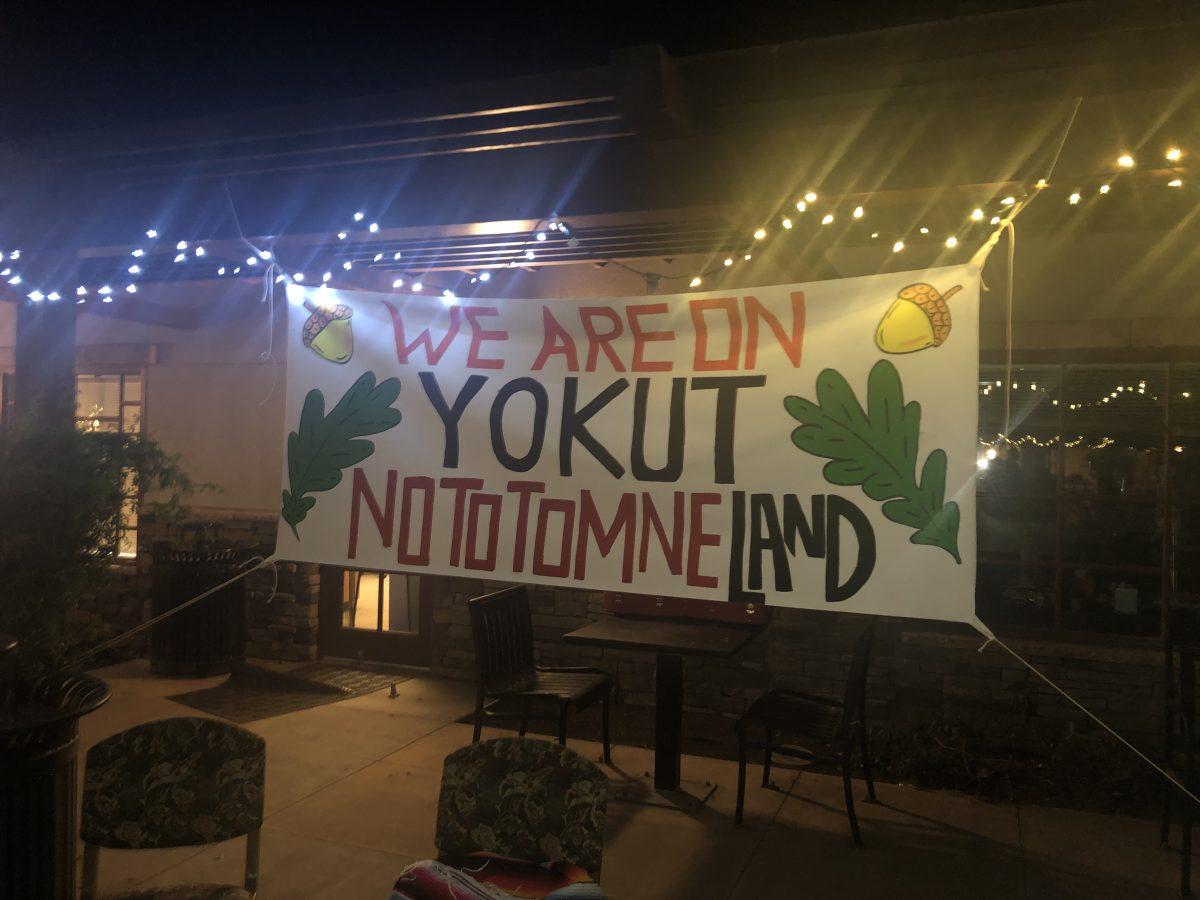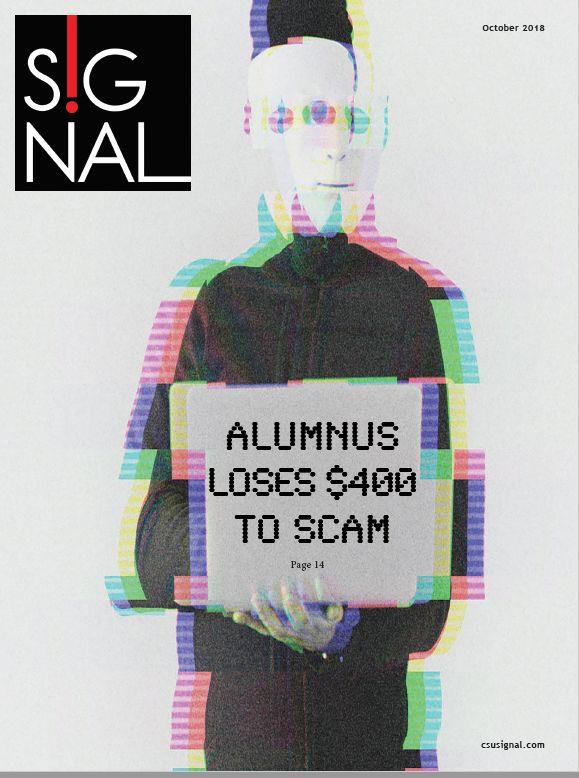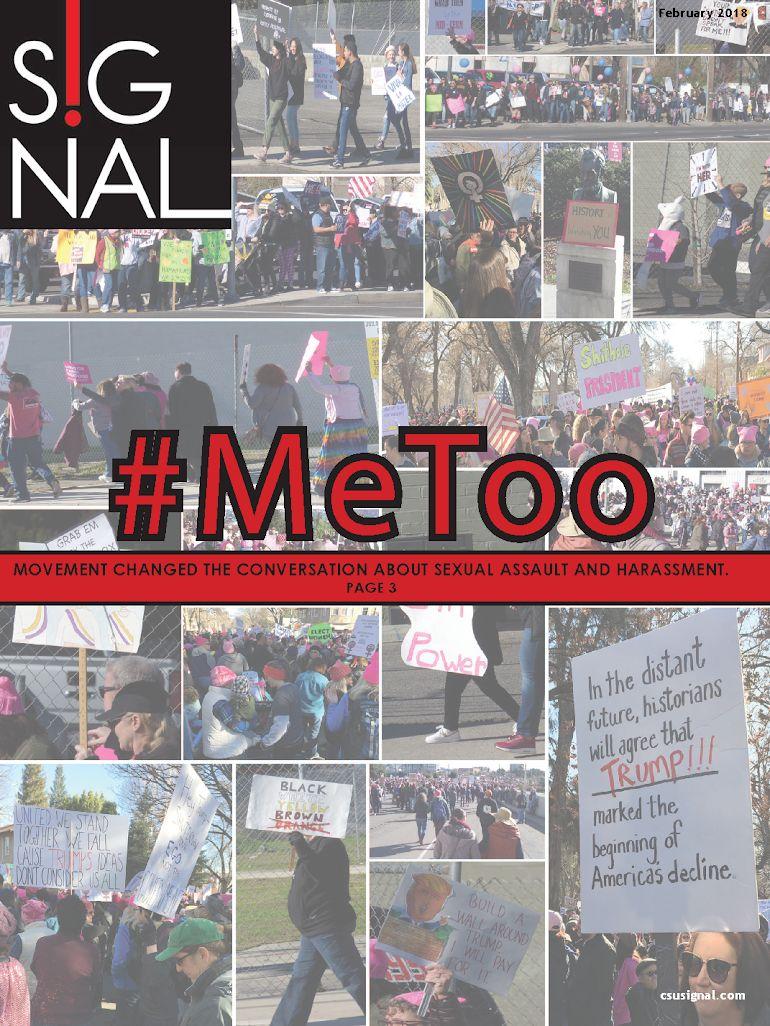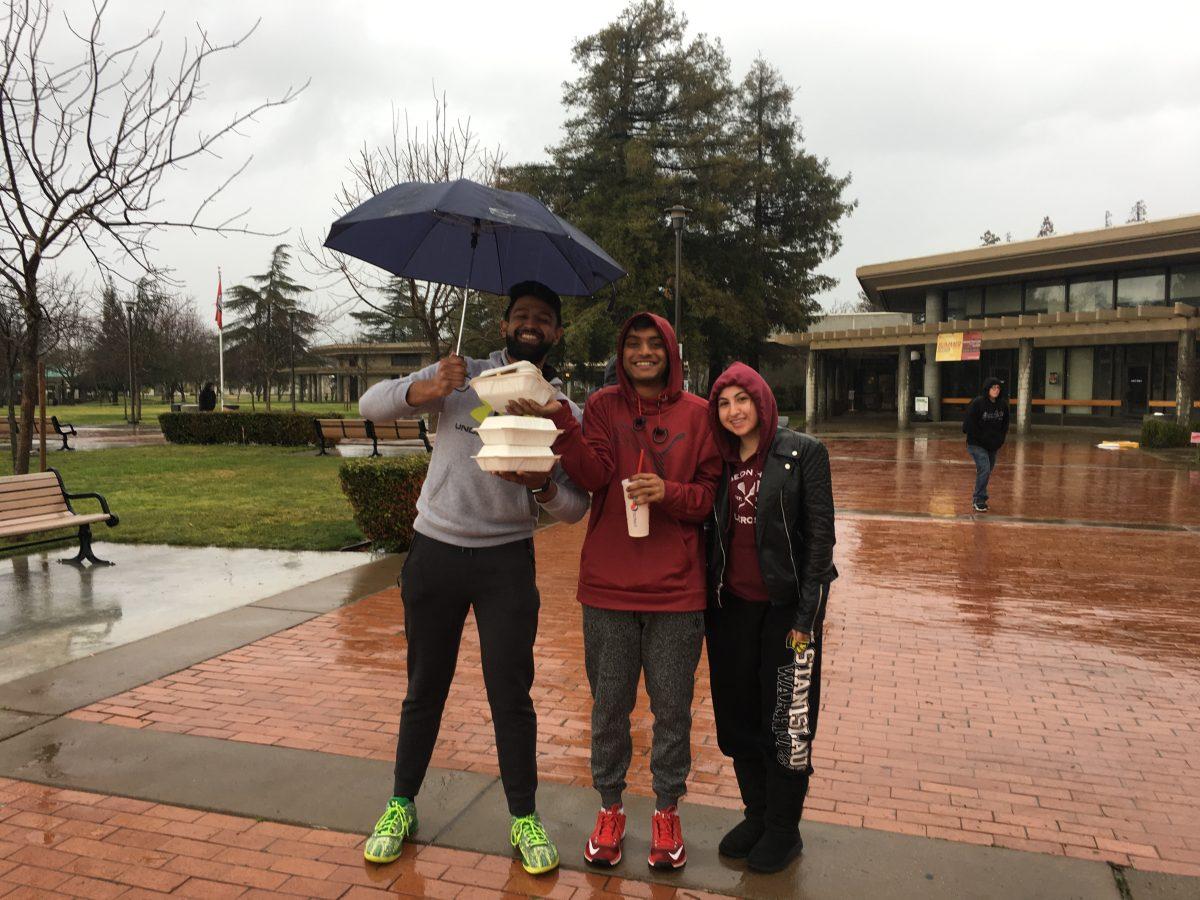From the time that women began to come forward about their experience with Hollywood Producer Harvey Weinstein, which sparked the national #metoo campaign, students and faculty have been encouraged to speak out about their experience with sexual harassment and how they’re putting a stop to it.
Sexual harassment is no longer just about fulfilling a state requirement for an individual who finds themselves on a college campus. The #metoo campaign as well as the women’s marches that have taken place across the nation this past January have shifted the conversation.
Students and faculty are speaking out, and they’re saying enough is enough.
Empowered
Alyssa Kelly (senior, Business) was just one of the students from Stan State, along with many other faculty members and alumni who attended this year’s Women’s March. She was surrounded by both women and men from all different ethnicities and cultures.
They were marching for more than just women’s rights that day, Kelly said, they were marching for equality. She added that the march was an “empowering” experience.
Vanessa Padilla (senior, Sociology) has also noticed the shift in the conversation regarding sexual harassment. She felt that the perspective people have taken before towards stories of rape and sexual assault have been misaligned, and hopes it is just the beginning to change.
“I know people around me who have faced sexual assault, and it hurts knowing the people I love have gone through that pain,” Padilla said.
The #metoo campaign has created hope for the future for many students including Jaycie Wildermuth (junior, Kinesiology).
“It empowered me to stand up and know that I deserve to be treated with respect even in a situation that is not sexual harassment,” said Wildermuth. “Any sort of workplace harassment, that is not okay, and it empowered me to take a stand and come forward for others.”
Like Wildermuth, Demi Gonis (junior, Criminal Justice) felt the #metoo campaign has empowered people to take the opportunity to “step up” in situations where they would have otherwise been silent in the past.
The fact that many people have been silent for so long about the topic of sexual harassment was something that Mayah Chambers (junior, Criminal Justice) also found to be particularly unsettling. She added that the #metoo campaign has been a sufficient outlet for people to voice what they have been keeping in for so long.
“This lets them know that there’s people behind them, and they can seek justice,” Chambers said.
As Dr. Keith Nainby, Professor and Chair for the Department of Communication Studies, sees it, the #metoo campaign goes far beyond the statement, “that this happened to me also.”
“This is not something that happens only to a subset of women who are subjected to violence at the hands of a subset of men. This is a system that is in place,” Dr. Nainby stated.
Student athletes respond to #metoo
#Metoo has also played a role in the conviction of Larry Nassar, the former USA Gymnastics national team doctor who sexually abused over 100 gymnasts. Female athletes at Stan State say the movement has changed the way they view the topic of sexual harassment and assault.
As a member of Stan State’s women’s soccer team, Chambers said the #metoo campaign has put into perspective how many people, even athletes, have been affected by crimes of sexual harassment and assault. She said it also puts into perspective how many situations similar to Nassar’s victims people have experienced and “repressed” or “not realized,” even with training on sexual harassment.
According to Julie Johnson, Title IX Coordinator and Discrimination, Harassment and Retaliation Administrator at Stan State, athletes and other student organizations on campus must undergo mandatory sexual harassment training twice a year.
“Most of the ways it’s [sexual harassment training] has been brought to us is either through an online course that people don’t pay attention to, or people sitting in a school setting, or reading an email at work that they don’t pay attention to,” Chambers said. “When you hear stories of people you can relate to, it’s a lot more effective… Our culture is becoming zero tolerance.”
Gonis, also a member of Stan State women’s soccer team, said the required sexual harassment learning programs has given her the idea that sexual harassment is common, but seeing the multitude of stories of victims come out in the media has been a “Wow factor” for her.
Wildermuth, a member of the Stan State women’s track team, said it was important that “predators are being put on notice,” so that they can’t get away with disrespecting others any longer than they already have.
“Harassment periods run rampant in female sports, and I’d like to see people come forward,” Wildermuth said. “I had somebody tell me ‘You’re lucky it wasn’t sexual harassment,’ but harassment of any kind should not be tolerated. I think in female sports, there’s a need for a movement that is about stopping harassment and bringing equality in all aspects of female sports.”
Faculty’s frustration with “the structural issue”
The battle with sexual harassment within society is nothing new to many historians who study the subject.
Dr. Bret Carroll, Professor of Gender in U.S. History in the Department of History, said for years people have been afraid to speak out about their experiences with sexual harassment and assault for fear of the consequences that would follow.
Though he believes that the #metoo movement certainly helps raise awareness to the subject, the movement is incomplete because of its “lack of diversity and the foundation to make structural changes.” Dr.Carroll added the lack of diversity, in this case, is an economical one.
“The problem is not just getting more women to speak out. I mean, women speak out, Harvey Weinstein gets fired, big deal. Men who abuse their positions and power are like shark’s teeth. You knock one out, another one grows in and replaces it,” said Dr. Carroll. “Obviously it’s a good place to start, but the real issue is teaching people power doesn’t mean [prerogative] always.”
Like Dr. Carroll, Dr.Tamara Sniezek, Department Chair of Sociology and professor of courses such as gender studies and sociology, believes that the campaign is a response to the structural issue of sexual harassment within American society.
Being a mandated reporter for the campus has posed many challenges within her classes where she often hears student’s stories of sexual assault.
“Generally speaking we have had women report being raped, being a victim of domestic violence not just once but repeatedly. These are stories we hear all the time and they are heartbreaking, and it’s just sad, frustrating that we can’t really do anything but say, ‘Okay here’s your referral to the counseling center’ or in some cases where we say call the police,” Dr. Sniezek said.
Dr. Sniezek said she is required to put in her syllabus that she is a mandated reporter, which she is afraid will cause a chilling effect amongst her students.
“What happens typically is that they will miss an assignment, and it’s because they were assaulted. Or, they are starting to fail the class, and it’s because, you know, they have PTSD or some dealing with the after affects, and they have to tell professors what happened to them,” Dr. Sniezek said.
Dr. Nainby also felt that the #metoo campaign has had a great impact on the way in which people view the “complex nature of systems and how they function.” He added that people are more willing to recognize that the structural system of society is flawed in some ways.
One structural issue that Dr. Nainby has faced personally is his experience with the campus Title IX office. He stated that, generally speaking, Title IX offices are very policy oriented, and often move very slowly and cautiously when it comes to investigations of sexual harassment and assault.
“If I’m trying to support a woman on campus who’s been a victim of sexual violence, you want that to be the sort of investigation that moves swiftly because you want her to feel like she can move through a healing process,” said Dr. Nainby. “I’ve also had men confide in me, who were the subjects of investigations as people who were accused of violence, then have communicated to me that they also feel frustrated when the investigation moves slowly.”
He added that federal legislation and Title IX legislation has made quite a significant impact on how public universities act in support of students. “That’s a good thing to have on your side, but it comes with consequences,” Dr. Nainby said.
The institutional response to #metoo
Over the years, Stan State has taken many precautionary measures to prevent sexual harassment and assault from occurring on campus.
According to the Stan State annual security report, there was one instance of dating violence recorded in 2016, two instances of domestic violence in 2016, three instances of stalking in 2016, and zero instances of fondling in 2016. These statistics all reflect the same number of instances there were in 2015. However, there were zero cases of rape reported in 2016, which had decreased from four reported rapes in 2015.
In compliance with Executive Order 1095, Stan State’s Title IX office stands ready to listen and help any student who has been sexually harassed or assaulted on campus.
Johnson stated that Executive Order 1095 has expanded the current prevention training required of students in order to create a barrier of safety around the campus’s learning environment.
Johnson said that every freshman receives a pamphlet with resources available to them should they experience any type of misconduct or harassment. Such resources include the University Police Department (UPD), psychological counseling services and Haven Women’s Center.
According to Officer Matt Dillon, UPD handles cases of sexual harassment in “bullet-point” fashion to make sure that all parts of the case are properly reported. He stated that it is a team effort to do those things well.
Sergeant Cheri Silveira stated that UPD accepts the reports of sexual assault or harassment from a reporting party. A report for each instance of reported sexual assault or harassment is filed and kept within UPD’s Records Management System.
“Once we take the initial statement, we investigate the crime, make sure the person has contacts to a variety of resources…, and refer them to Title IX, who also assists with helpful resources and does their own investigation,” Silveira said in an email. She added that cases of sexual assault are top priority when they are reported to UPD.
Turlock Lead Advocate Joshua Palmer from Haven Women’s Center has been helping victims of harassment and assault since July of 2016.
“In the last year we’ve gotten over 2,500 clients in total, that’s including women, men and children…Women are our dominant clientele,” Palmer said.
Palmer stated that the Turlock Haven Women’s Center has a staff of about eight to nine people, which allows them to help around 50 or more people per month. The center helps students navigate how to file a restraining order, go through the Title IX process, and helps the victim find the best course of action that would make them the most comfortable.
“We encounter so many people that didn’t know that we were here, and so conversations like #metoo can help us advertise our services,” said Palmer. “We try to provide what we can, and education is one of our big components, so if there are people that are wanting to know more about domestic violence, sexual assault, human trafficking, we can provide those resources too.”
Alexander Aust, Stan State’s Residential Life Coordinator, stated that the campus works closely with Haven Women’s Center to train resident assistants (RAs) on how to handle situations involving victims of abuse, and has a non-retaliation policy to encourage victims to come forward.
“If someone comes to you and tells you that they’ve been assaulted, they’re confiding in you because they trust you, and your job in that situation is to believe them and support them,” Aust said. “I think out of people’s good nature they want to fix the problem, but your job isn’t to fix the problem. Your job is just to provide support and help. Part of that is believing them and validating that what happened to you is terrible and it was not your fault.”
Aust added that “bystander intervention” is an important way to prevent assaults from occurring in the first place.
To receive support and guidance through a case of sexual harassment or assault contact UPD at (209) 667-3114, the Title IX office at (209) 667-3351 or Haven Women’s Center at (209) 577-5980.
Adino Byrd, Emily Hake, Megan Lavilla, Noor Miqbel, Juan Ruiz, Daniel Solorio, and Jesus Valdez contributed to the reporting of this article.
Categories:
#MeToo inspires a change in conversation at Stan State
0
Donate to Signal
Your donation will support the student journalists of California State University, Stanislaus. Your contribution will allow us to purchase equipment and cover our annual website hosting costs.

